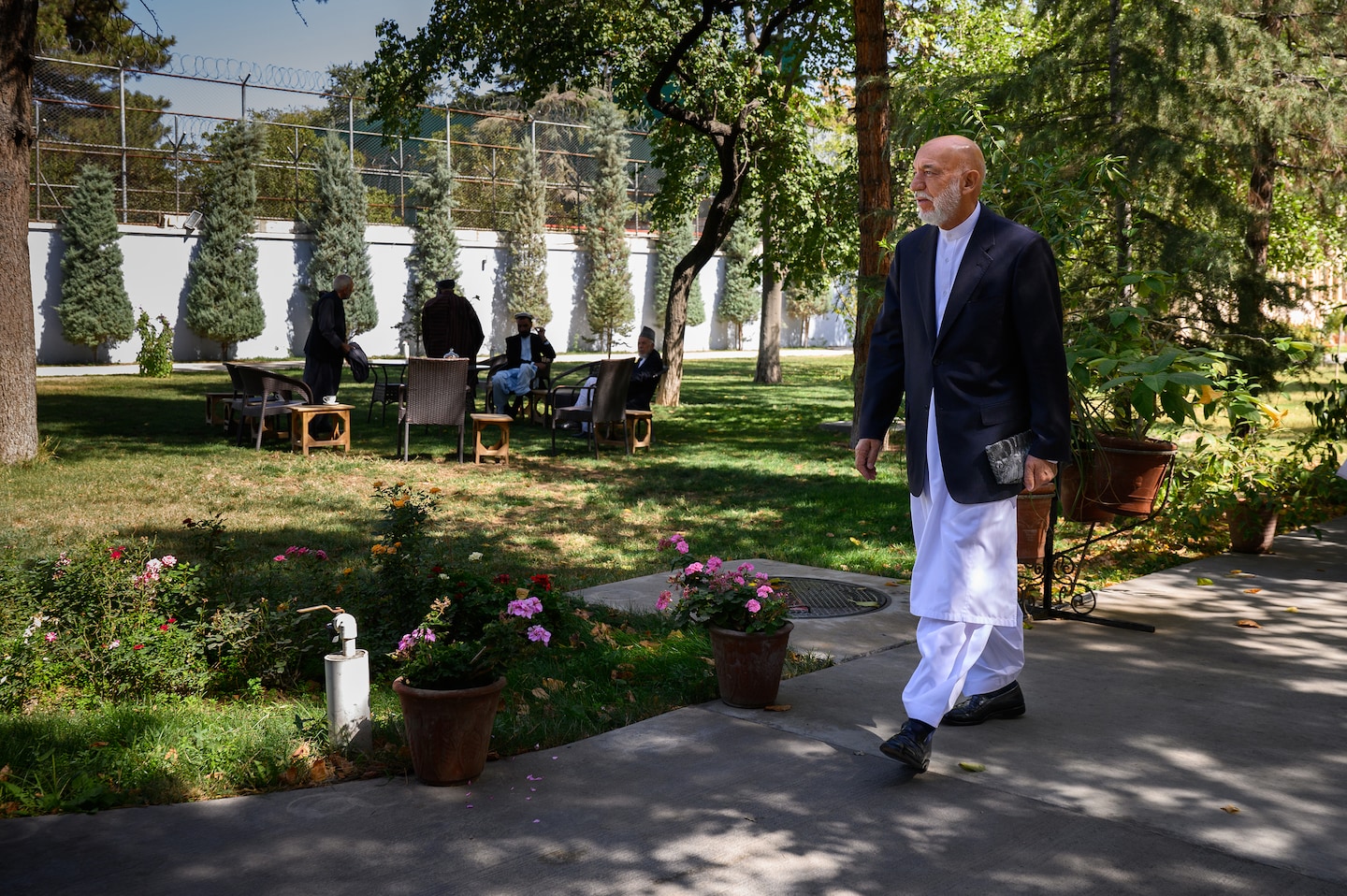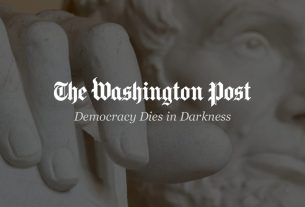A: Of course, we Afghan people are tremendously concerned at the way the country is right now and the way it’s heading. But we are also hopeful that we will soon be able to manage things better and take good, reasonable stock of why we are here and how we can get out of this extremely difficult situation for us.
Q: It’s been more than a year now, and the Taliban initially had promised an inclusive government. We’re not seeing that. Most Afghans I have spoken with, especially members of the country’s ethnic minorities, say they have little faith or hope in the Taliban. They cite the fact they are not represented properly in the government today. Do you think the Taliban will ever create an inclusive government? What is needed for this to happen?
A: We saw how things didn’t work for Afghan governments when there was one element of it or the other element of our society absent from it. … For the good of the Taliban themselves and for the good of the country, it is important that they begin a process of inclusivity by launching a grand Afghan dialogue, of Afghans talking among themselves and getting agreements on things and moving forward. This country needs to have a constitution.
Q: I’m sure you’ve discussed this need for an Afghan dialogue with the Taliban. What’s their response?
A: On the principle of things, there is an agreement. They say yes. On a national dialogue being imperative to a better Afghanistan, there is an agreement. On getting it launched and done, we haven’t yet gotten where we should be. I had my last conversation on this issue just last week with a very senior Taliban leader. … I will not say that we will be there soon. It would be very premature for me to say that. But I can tell you I am having better vibes in the past two weeks than I had before that. Let’s call this cautious optimism.
Q: And if the government remains not inclusive and there isn’t this dialogue, could we see the collapse of the Taliban government without this kind of unity?
A: We don’t want the collapse of governments in Afghanistan. We want representative governments in Afghanistan.
Q: Does the United States have a certain amount of responsibility for the state of today’s Afghanistan?
A: Both the United States and Afghanistan. We both are responsible. I have had lots of disagreements and quarrels with the United States on issues. … But I am not going to lay the whole blame at the door of the United States. We Afghans are responsible as well in many, many ways.
Q: How would you describe the Biden administration’s policies right now toward Afghanistan and the Taliban?
A: I strongly disagree with the decision to strip the Afghan reserves, keeping half of it for the possibility of distribution to the 9/11 victims, with whom the Afghan people commiserate fully. … We as the greatest victims of terrorism commiserate fully with American families who lost lives and suffered in that great tragedy of Sept. 11. It is morally wrong to take money from the greatest victim and the poorest victim and give it to another victim when both are victims of the same atrocity, of the same oppression. That’s wrong. … We want the strongest of relations with the American people and the U.S. government. But, of course, we also want those relations to benefit Afghan people as well.
Q: What more should the Biden administration be doing?
A: They should help Afghanistan stabilize.
A: By an international effort, by bringing back a coalition of powers that will support Afghanistan. … We don’t want Afghanistan to be a centerpiece in rivalry between the United States, Russia and China. That’s what happened to us in the 19th century between the British and czarist Russia. That’s what happened to us in the 20th century between the United States and the Soviet Union. We see that trend developing again today. … We don’t say that America has no interest, or America should not have interest in this region. They do. They have. What we’re saying is that you pursue your interest in a way that will not bring Afghanistan to suffering or destruction.
Q: Does the United States have a moral obligation to do this?
A: For reasons historic between us, yes it has.
Q: What should the Taliban do to gain more trust of the United States and the world?
A: The first thing is creating a situation inside Afghanistan where the will of the Afghan people is expressed. And we get a government that is seen as legitimate inside the country and is supported by the Afghan people. Look at the issue of our schools. Our girls are not able to go to school. Look at the Afghans running away from the country. Look at the increasing poverty. None of that will improve unless girls go to school, unless opportunities are created and unless all the Afghan people find themselves as owners of this country, as present in decision-making for this country, as represented by the government of the country. And as a country and a government that is visibly moving towards the betterment of life here, which isn’t the case right now. When this happens, then we should go to the international community for recognition.
Q: Do you think your own government was partly responsible for paving the way to last year’s collapse?
Q: How do you respond to this criticism?
A: The war in Afghanistan was not our war. I was against that war. I was not a partner of the United States in that war against Afghan villages and homes. I stood against it, and I worked against it. I changed from the moment I recognized that this war that is fought in the name of defeating terrorism is actually a war against the Afghan people. I stood up to the United States. That was the fundamental issue between me and the United States. And I called the Taliban “brothers” for that reason. Because the Afghans were being killed on both sides of the divide that foreigners created in us for their own objectives.
I wanted the United States of America to be an ally of the Afghan people and not to fight a war in our villages. They knew, the Americans, that the sanctuaries were in Pakistan. They told us that repeatedly. And they would bomb Afghan villages. They would come and tell us that Pakistan was training extremists and terrorists. Then, they would go and pay them billions of dollars. When this was repeated and repeated, I had only one conclusion. The conclusion was either the Americans are doing this on purpose, or that they are extremely naive and out of touch with the realities of this region.
Q: Some of our critics and opponents say you were a little too cozy with the warlords and technocrats who were bilking billions, or millions, of dollars, from Afghanistan who helped destroy the country. Do you regret this?
A: I take full responsibility for the corruption and bribes in the delivery of services, as it is in many parts of the world. But the big contracts, big corruption, in hundreds of millions of dollars or millions of dollars, was clearly a United States of America thing. … Yes, there was corruption, but to blame Afghans or the Afghan government for it, is wrong. We do take responsibility. I would never say there was no corruption. But who was responsible for it? Afghans or our international partners? Mainly our international partners, and they know it. They will admit it.
Q: You have repeatedly called for the Taliban to allow girls above sixth grade to attend schools. This has not happened, despite promises by them. Why is this? Is there some kind of internal struggle going on?
A: This is very difficult to explain. We want them to address this issue. A great many Taliban leaders are very much for education. I can name a lot of them. The fact it is not happening has to be explained.
Q: You talk with the Taliban. Do you get any sense why? Is it one or two people who don’t want this?
A: There is support. But a decision cannot be made.
Q: Would the political situation be different today if President [Ashraf] Ghani had not fled Afghanistan?
A: The state would not have collapsed. Ghani leaving was the collapse of the whole thing.
Q: In contrast, you and [Abdullah] Abdullah did not flee the country, despite the fact that the Taliban brutally killed [former Afghan president Mohammad] Najibullah when they first took over Kabul in 1996. Did you not fear for your security?
A: This is my country. I don’t leave my country when it is in trouble.
Q: You were thinking about what happened to Dr. Najibullah. Right?
A: Absolutely. I was not sure of my own safety. That’s why I left my house that evening and went to Dr. Abdullah’s house and we stayed together. But I would have never left and I will never leave.
Q: Some say you want to become president again?
A: No. I had a formidable presidency for 14 years, where Afghanistan rose back to be present all over the world, our flag flying high around the world, where I engaged in great relationships with the rest of the world, established strategic partnerships. … I did my time. And that’s enough.
Q: What is your relationship with the Taliban? How often do you speak to its leaders?
A: Some of the leaders come and speak to me very often, and very frank conversations. But the relationship is at times tense as well because of what I say, because of what I ask of them. But I will continue to ask for what I believe is right for Afghanistan and I’ll continue to ask the Taliban leadership to adapt to a situation whereby they benefit from the will of the Afghan people, that allows all Afghans to participate in decision-making for the country,
Q: Deep in your heart, do you think the Taliban will allow [a national Afghan dialogue and a representative government]?
A: It has to happen. They have no other alternative.



